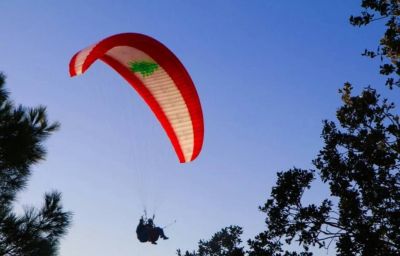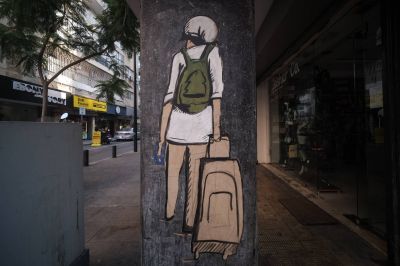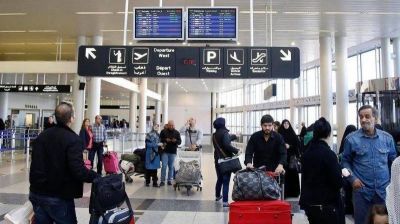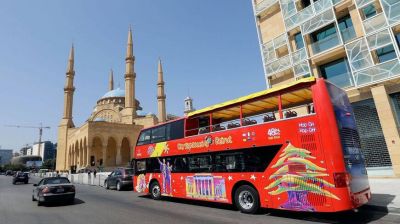A city sightseeing bus is pictured parked outside Mohammad al-Amin Mosque in Beirut on May 20, 2019. (Credit: Joseph Eid/AFP/File Photo)
BEIRUT — Following recent violent clashes in Saida's Ain al-Hilweh Palestinian refugee camp, travel advisories from some Gulf countries emerged calling on their nationals to avoid travel to Lebanon or for those already in-country to leave, while other countries urged their nationals currently in the country to be vigilant.
L'Orient Today spoke to industry experts about how this recent development may affect Lebanon's thriving summer season.
"In principle, we haven't seen a direct impact yet, but we believe that, eventually, we might experience a medium-term impact," the head of both the Federation of Tourism Syndicates and the hotel owners’ syndicate, Pierre Achkar, told L'Orient Today. "It is definitely a negative episode, but we need to wait to see the reaction of tourists from these countries."
On Saturday, Saudi Arabia asked its citizens to leave Lebanon quickly, while Kuwait and Qatar urged their citizens to remain vigilant. The following day, Bahrain and the UAE urged their nationals to "respect previous statements advising against travel to Lebanon and to leave Lebanese territory to ensure their safety." The same day, the Sultanate of Oman urged its citizens in Lebanon to remain vigilant.
These advisories came in the wake of armed clashes in the Ain al-Hilweh camp, where at least 13 people were killed last week. According to security sources, fighters from the Fatah movement clashed with groups close to radical Islamists. Located adjacent to the coastal city of Saida, the Ain al-Hilweh camp is home to some 80,000 Palestinian refugees, making it the largest Palestinian refugee camp in the country.
Tourists from Gulf 'rarely set foot' in Lebanon
The head of the Federation of Tourism Syndicates said "there have been no hotel reservation cancellations," adding that the tourism season's momentum remains at its peak and is expected to continue until mid-September, "as our records show."
He noted, however, that tourists from Saudi Arabia, the UAE, Kuwait and the Sultanate of Oman, who once frequented Lebanon's mountain areas — such as Aley, Bhamdoun, Sawfar — in the summer, these days "rarely set foot here." He added that this has been the case for almost a decade.
"Tourists from these countries own houses and hotels in these areas, and now they are either shut down or rented out," Achkar said. This trend started since chants like "death to the Saoud family" emerged in Lebanon, he added.
In 2015, Hezbollah listed Saudi Arabia's leadership alongside traditional enemies Israel and the US. During a televised speech in Beirut in October 2015 to mark the annual Ashoura commemoration, the party's leader Hasan Nasrallah attacked Saudi Arabia for its intervention in Yemen and Bahrain while Hezbollah members chanted "death to the Saud family."
Fear of spillover
With the Lebanese diaspora in the lead, Iraqi, Jordanian and Egyptian tourists represent the bulk of visitors to Lebanon this summer, Ackhar told L'Orient Today.
The data confirm that the number of visitors to Lebanon almost doubled between 2021 and 2022, from nearly 2.1 million to almost 4 million. This trend is likely linked to the lifting of travel restrictions imposed during the COVID-19 pandemic. The number of Lebanese visitors increased by 109 percent over this period, compared to 65 percent for foreign visitors.
Meanwhile, statistics from the Tourism Ministry and General Security indicate that 62.6 percent of the nearly 2.5 million visitors in 2022 were in fact expats. This percentage of Lebanese expats visiting in 2022 was higher than the previous year. In 2021, 56.9 percent of visitors were Lebanese expats (1.2 million).
But Achkar does harbor concerns that Gulf countries' travel advisories could affect the attitude of tourists visiting Lebanon from other countries in the region.
However, he noted, "the [Lebanese] diaspora who have already booked and paid for family-package flights and hotels to visit Lebanon are less likely to cancel their trip, especially when they know that these events are common in Lebanon and especially since the events did not spread to other refugee camps or areas in Lebanon."
"But foreign visitors might not size up the situation in the same way," he said.
On Monday, caretaker Interior Minister Bassam Mawlawi said that "all the statements issued by the brotherly Arab countries are a source of trust, and we are very keen on our Arab brothers … and these measures that they are taking to ensure the security of their citizens."
Mawlawi also asserted that the situation in Ain al-Hilweh refugee camp "has calmed down, and the security measures are proceeding, while efforts are continuing to arrest the perpetrators."
Booking requests overrun
Professionals in Lebanon’s tourism sector were already pleased in early July, as the summer season hinted at record success.
"I wish we were able to answer to all the booking requests [for beach clubs and resorts]," Beyrouthi said, adding that his sector has been overwhelmed with the number of tourists pouring in.
"I can say we have experienced a 5-10 percent increase in the number of tourists this year compared to last year," he added.
Once in Lebanon, visitors don’t typically stay home. Beaches are often overrun, with some being forced to turn people away in the middle of the day, particularly in Batroun in North Lebanon and Jounieh in Kesrouan.
Figures reported in 2022 by caretaker Tourism Minister Walid Nassar indicated that over 1.72 million visitors landed in Lebanon last summer and spent some $5 billion. At a conference in Dubai in May, Nassar estimated that Lebanon could expect no fewer than 2.2 million visitors (mostly in the summer) over the year and generate at least $9 billion in revenue.
In May, the head of the Lebanese Restaurant, Nightclub and Café Owners' Association, Tony Rami, said that "around 250 new outlets had recently opened [in Lebanon]."
Beyrouthi noted, however, that "there has been a disparity in the number of tourists visiting different Lebanese regions," but he declined to specify which areas have been experiencing high tourism flow versus which have not.
Beyrouthi expressed hope that Gulf countries' nationals would visit Lebanon again, adding, "We respect and understand the advisories these countries had to give their citizens but the area that was affected by violence is confined."



